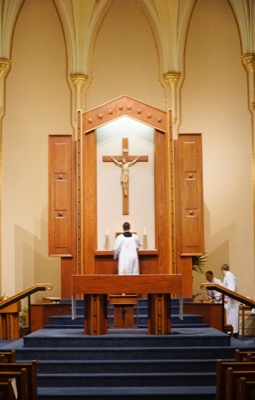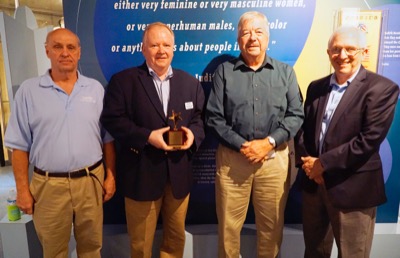Friday, April 14th, 2017
Disease presents communion dilemma
By Sydney Albert

Photo by Sydney Albert/The Daily Standard
The altar at Coldwater Holy Trinity Church is cleared away after Mass. Many local Catholics receive communion regularly when they go to church, but those with celiac disease may need to explore other options.
Joni Baumer of Coldwater and other Catholics like her have struggled at times with feeling left out of one of the biggest parts of their religion: the sacrament of Holy Communion.
Due to celiac disease - a genetic autoimmune disorder aggravated by consumption of gluten - Baumer refrains from receiving the Eucharist, which Catholics believe is the body of Jesus Christ.
For Baumer, the problems arose about six weeks after a surgery. Despite extreme fatigue, she had trouble sleeping through the nights, and she struggled with aches and pains on a daily basis. Baumer visited doctors and had tests done, all to no avail, and for the longest time she went without answers.
" 'It's all in your head,' 'it's just hormonal,' 'ask your family doctor for an antidepressant,' and one doctor even said 'I don't even know who to refer you to.' So this is what I was facing. No one knew what to do and I was struggling. They could see I wasn't doing well, but nobody knew what to do," Baumer said.
With no one else to turn to, Baumer said she turned to the only person she felt was left: God.
"As Catholics, we are given tools to help us when we have difficulties. We have many prayers that we can use, and I prefer the rosary. I prayed it often, sometimes many times in a day," Baumer said. "I went to Mass and I would receive Holy Communion and ask, 'Please help me, God. Please help me find answers.' "
In June 2010, she finally received a diagnosis. After finishing blood work and taking note of several deficiencies, Dr. Glen Aukerman, then serving as the director of Ohio State University's Center of Integrated Medicine, diagnosed Baumer with celiac disease.
At first, Baumer was just happy to have an answer. All she had to do was watch what she ate and take supplements to help with her deficiencies. Yet as time went on and she started to cut out foods from her diet, she began to realize that she might be more sensitive to gluten than most - and Dr. Aukerman confirmed this.
"It kind of dawned on me that I would have to give up communion, which was very hard because it's just a part of your life," she said.
A priest suggested she could take the consecrated wine offered with the Eucharist during communion, but Baumer worried people going before her who ate the host would cross-contaminate the wine, a common concern among Catholics with celiac disease. It was then that the priest suggested a gluten-free host.
Gluten-free hosts have existed in some form or another for about a decade, and though other Christian denominations have used them, the Vatican found them unacceptable, according to an ABC news report. In 2012, the US Conference of Catholic Bishops wrote in a statement that "it is impossible to consecrate a host made of something other than wheat and water."
Options are still available for Catholics with gluten sensitivities, however. The Benedictine Sisters of Perpetual Adoration in Clyde, Missouri, make a special low-gluten host that the Vatican has approved. To be labeled gluten-free, a product's gluten content must be less than 20 parts per million, and the nuns' bread contains less than 100 parts per million. The hosts may contain slightly more wheat than true gluten-free products, but due to their low percentage, they are safe enough for many people with celiac to eat.
Still, Baumer says, the severity of celiac disease can vary greatly from person to person. Some people may experience minor discomforting symptoms while others, like her, are more severe. With her sensitivity, the low-gluten wafer didn't seem like an option.
"As Catholics, it's supposed to be made with wheat. So how they make the gluten-free host is they use a wheat starch," she said. "Now a starch is where most of the gluten, the prolamin, the protein, most of it is removed. Even though it's supposedly gluten-free, for me it isn't."
For those who cannot drink the wine or eat the low-gluten host without having an adverse reaction, a third option in the form of a prayer is available, Baumer said her priest told her. Spiritual communion is a small prayer that can be said in place of taking the wine and host.
Baumer said she still found it hard at first not to take part in communion with the rest of the congregation. People would have to move around her to get to the aisles, and Baumer said she felt the weight of people's stares.
"At one point I was talking to a priest about it, though, and he said, 'You honestly don't think [Christ] understands?' " she said.
After all, aside from Dr. Aukerman, she credits God with the fact that she finally got answers about her condition. She may not be able to partake in traditional communion, but she still feels Christ comes to her.




